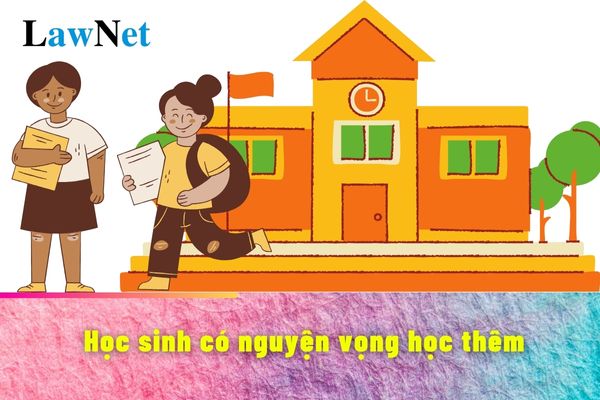What should students do if they wish to take internal extra classes in Vietnam?
What should upper secondary school students do if they wish to take internal extra classes in Vietnam?
Based on Article 5 of the Regulations on extra teaching and studying issued with Circular 17/2012/TT-BGDDT as follows:
Organization of extra teaching and studying in the school
1. Students wishing to take extra classes must write an application for extra classes and submit it to the school; their parents or guardians (hereinafter referred to as parents) must directly sign, make commitments with the school regarding extra teaching and studying in the application, and take responsibility for fulfilling the commitments.
2. The school principal receives the extra class application from the students, organizes student groups according to their academic performance, assigns teachers to subjects, and arranges extra teaching according to the students' academic levels.
3. Teachers wishing to teach extra classes must register for extra teaching; in the registration, they must commit to the school to fulfill all the duties of a teacher according to common regulations and other tasks assigned by the school, while strictly following the regulations on extra teaching and studying in the school.
4. The school principal reviews the list of teachers for extra teaching, assigns extra teaching tasks, and arranges extra teaching schedules suitable to the students' academic levels.
Thus, students wishing to take internal extra classes must:
- Write an application for extra classes submitted to the school;
- Parents or guardians must directly sign, make commitments with the school regarding extra teaching and studying in the application, and take responsibility for fulfilling the commitments.

What should upper secondary school students do if they wish to take internal extra classes in Vietnam? (Image from the Internet)
What is the assessment of training results of upper secondary school students in Vietnam?
Based on Article 8 of Circular 22/2021/TT-BGDDT on the assessment of upper secondary school students' conduct as follows:
- Basis and organization of conduct assessment
+ Conduct assessment is based on the main qualities and general competencies required at different levels corresponding to the subjects and educational grades specified in the overall program and the specific competencies required in the subject programs in the general education program.
+ Subject teachers provide comments and assess students' conduct, progress, outstanding strengths, and main limitations based on the regulations stated in point a of this section during the course of their practice and study.
+ Homeroom teachers monitor the students' practice and study progress based on the regulations stated in point a of this section; refer to comments and assessments from subject teachers, feedback from parents, relevant organizations, and individuals in the educational process; guide the students in self-assessment; and on that basis, provide comments and assessments of the students' conduct as stipulated in clause 2, Article 8 of Circular 22/2021/TT-BGDDT.
- Students' conduct assessment for each semester and the entire academic year
Conduct assessment for each semester and the entire academic year is assessed at one of four levels: Excellent, Good, Qualified, or Unqualified.
- Conduct assessment for each semester
+ Excellent: Meets the main quality requirements stipulated in the general education program and has many outstanding features.
+ Good: Meets the main quality requirements stipulated in the general education program and has outstanding features but not yet excellent.
+ Qualified: Meets the main quality requirements stipulated in the general education program.
+ Unqualified: Does not meet the main quality requirements stipulated in the general education program.
- Conduct assessment for the entire academic year
+ Excellent: the second semester is rated Excellent, the first semester is rated Good or higher.
+ Good: the second semester is rated Good, the first semester is rated Qualified or higher; the second semester is rated Qualified, the first semester is rated Excellent; the second semester is rated Excellent, the first semester is rated Qualified or Unqualified.
+ Qualified: the second semester is rated Qualified, the first semester is rated Good, Qualified, or Unqualified; the second semester is rated Good, the first semester is rated Unqualified.
+ Unqualified: The remaining cases.
Shall a student with Unqualified training results for the whole school year undergo training during summer break in Vietnam?
Based on Article 13 of Circular 22/2021/TT-BGDDT on training during summer break for upper secondary school students as follows:
Practice during the summer vacation
1. Students whose entire year's conduct is rated as Unqualified must practice during the summer vacation.
2. The form of training during summer break is stipulated by the Principal.
3. Based on the form of training during summer break, the homeroom teacher assigns training during summer break tasks to the students and notifies the parents. At the end of the summer vacation, if the practice tasks are assessed as completed by the homeroom teacher (including a report on the process and results of fulfilling the practice tasks signed by the parents), the homeroom teacher may suggest the Principal re-assess the student's conduct for the entire academic year. The re-assessment results are used in place of the annual conduct assessment to consider class progression according to Article 12 of this Circular.
Thus, upper secondary school students with an annual conduct assessment of Unqualified must practice during the summer vacation.

